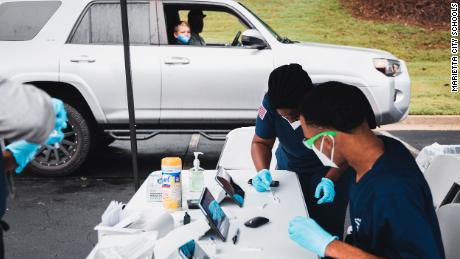Most parents don’t plan to vaccinate young children against Covid-19 right away, KFF survey finds

By Jen Christensen, CNN
A Covid-19 vaccine could be available for little kids soon, and public health leaders say vaccinating them could help end the pandemic — but only if parents actually get them vaccinated.
A new survey suggests that’s uncertain at best.
The majority of parents say they will not get their younger children vaccinated right away, according to the survey published Thursday from the Kaiser Family Foundation.
“Right away,” could be as early as next week when vaccine advisers to the US Centers for Disease Control and Prevention are meeting to discuss if the agency should recommend the Pfizer/BioNTech vaccine for 5- to 11-year-olds. Some 28 million children would be eligible for the Covid-19 vaccine, and pediatricians and pharmacies are already preparing to administer their shots.
But the survey found that among parents of children ages 5 to 11, only 27% said they will vaccinate their children against the virus as soon as a vaccine becomes available.
That number has stayed pretty much the same since July, even though there has been mounting evidence that the Pfizer vaccine is safe and effective for these younger children. The vaccine is already authorized for children and teens 12 and older
In September, Pfizer announced initial results from its trial that showed the vaccine generated a “robust” antibody response in 5- to 11-year-olds.
The news seemed to have “little impact” in persuading parents to get their kids vaccinated right away, according to the Kaiser Family Foundation researchers.
Since then Pfizer has presented even more positive evidence about its Covid-19 vaccine. In a document posted last week, Pfizer said its vaccine is safe and 90.7% effective against symptomatic Covid-19 in the younger kids.
The US Food and Drug Administration also said that the benefits of vaccinating younger children appear to outweigh any risks under a variety of scenarios.
Not all parents who were surveyed may have fully known about this additional safety information, since the poll was conducted from October 14 to 24.
Parents seemed most concerned about vaccine safety.
About 76% of those surveyed said that they were “very” or “somewhat” concerned about long-term side effects, while 71% worried about serious side effects.
A growing number of people also seemed to believe the myth that vaccines could impact fertility.
About 66% of people surveyed said they worried about the vaccine’s effects on a child’s future fertility. In January of this year, only 3% of adults who responded to a Kaiser Family Foundation survey about vaccine hesitancy had heard or believed that the vaccines would negatively affect fertility.
There is no evidence that shows any of the Covid-19 vaccines cause fertility problems, according to the CDC.
Some parents may not believe kids even need the vaccine. While proportionally fewer children than adults have died or been hospitalized due to Covid-19, at least 745 children have died from Covid-19 in the United States since the start of the pandemic. Thousands of children have been hospitalized, according to the CDC. Children could also suffer long-term effects from even mild Covid-19.
“It would be a good idea to vaccinate the children,” Dr. Anthony Fauci, director of the National Institute of Allergy and Infectious Diseases, told CNN’s Don Lemon on Wednesday.
“From a statistical standpoint, when children get infected, it is very much more likely that they would not have a severe outcome compared to an elderly person like myself, or someone who has an underlying condition, but that doesn’t mean that the kids are exempt from some serious illness because all you need to do is go to the pediatric hospitals around the country and you see, particularly with the Delta variant, which has a much greater chance of transmitting, that more kids are getting infected.”
Fauci said vaccination for children is also important to reduce the spread of the disease.
“There’s really good reason to have the children vaccinated,” Fauci said.
Fauci hopes that public health outreach to parents will be able to persuade them to get their children vaccinated.
For those who hope parents will get their little kids vaccinated, there may be one silver lining in the survey: About a third said that they would “wait and see” how the vaccine works in other children first. That result is also consistent with the surveys from July, and that’s not a hard no.
“Those in the ‘wait and see’ category are persuadable and movable. We just have to speak to them in plainspoken terms,” Dr. Chris Pernell, health equity officer at Rutgers New Jersey Medical School, told CNN’s Jake Tapper on Wednesday. “We have to ensure that parents understand the cumulative benefits of vaccination outweigh any potential risks and we have to make sure access to vaccines for children are readily available at schools, pharmacies, as well as their pediatricians’ office.”
The-CNN-Wire
™ & © 2021 Cable News Network, Inc., a WarnerMedia Company. All rights reserved.